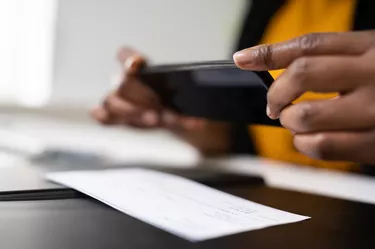
A checking account provides many consumers with a convenient way to pay bills and make purchases; however, checking accounts do come with some degree of risk. Overdraft fees, monthly fees, bounced checks and returned payments can result in an overdrawn account. If you have a checking account with a negative balance, the bank usually won't let you close that account until the balance is in positive territory.
Significance of a Negative Balance
Video of the Day
According to the Office of the Comptroller of the Currency, banks generally don't close accounts that have a negative balance, so even if you request the closure of the account while it's in a negative status, chances are the bank will not honor it. A negative balance indicates that you owe money to the bank.
Video of the Day
If the account is overdrawn due to overdraft fees, you may be able to request that some, or all, of the fees are removed. The bank may comply if the account had a good history up until that point; however, if your account has a history of negative balances, the bank may be less inclined to remove any fees for you.
Considerations Before Closing an Account
The bank will require you to bring the account to a positive status to close it, either by making a deposit into the account or transferring funds from another account into the account with the negative balance. Any externally initiated deposits, like direct deposit from your job or Social Security benefits, will also contribute to lowering the negative balance, since the bank will apply all newly deposited funds toward the negative balance first. You want to bring the account current as soon as possible to avoid an increase in the negative balance.
To close out your account once you've brought the account positive, you'll need to fill out a closing form. You may need to obtain this form in person, but some banks, like the Chase account closing form, can be found on the company's website. That means you can print it out, fill in the required information and mail it in when you're done.
Consequences of a Negative Balance
If you allow your account to remain negative for an extended period, the bank may unilaterally decide to close the account. This will not relieve you of the financial obligation. In fact, it can make the situation worse.
The bank will report the account to ChexSystems, which is the credit reporting agency for financial institutions. Most banks check the ChexSystems database before opening a new checking account and will not open an account for you if you have a record in ChexSystems, even if you've paid the amount owed. Consumers reported to ChexSystems remain in its database for five years.
Warning on Neglecting Negative Balances
The bank may place an unpaid balance with a collection agency. A collection agency will report the account to the credit bureau. Collection accounts are a negative mark on your report and can lower your credit score. Depending upon the dollar amount owed, the collection agency may decide to sue you to obtain a judgment, which gives the agency the right to garnish your wages or place a lien on your property, depending upon the laws of your state.